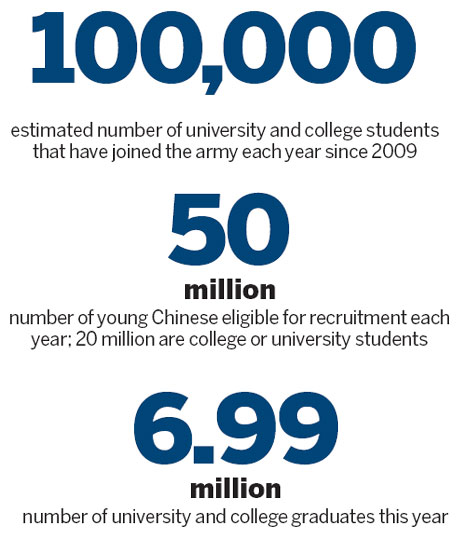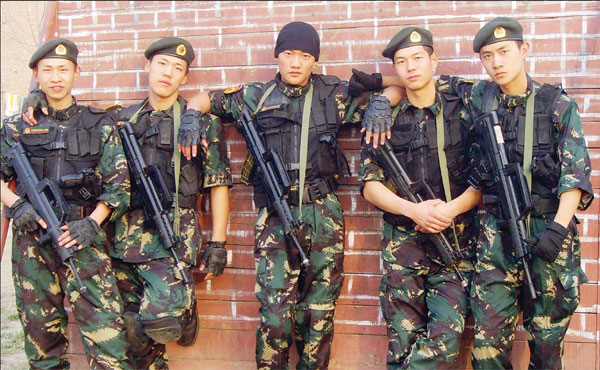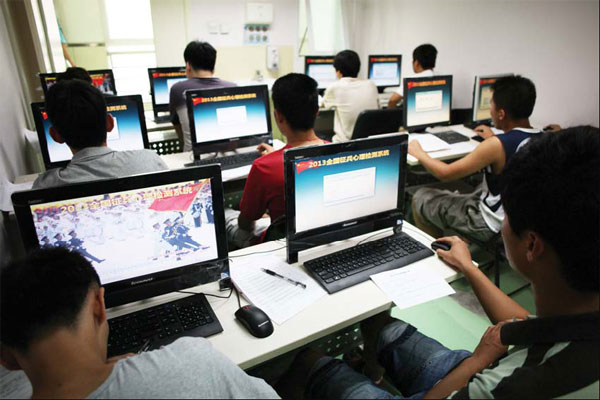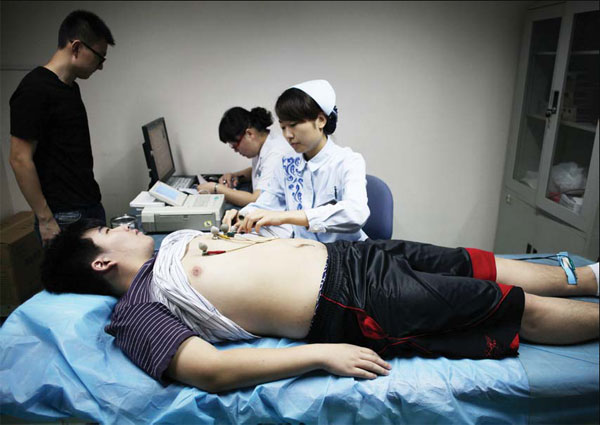Ready for roll call
Updated: 2013-08-23 08:09
By Zhao Shengnan (China Daily)
|
|||||||||||
|
Tan Xiaotong, far right, with his fellow soldiers during his two-year period of service in the army. Provided to China Daily |
|
Students take a psychological test in Beijing during the summer and autumn recruitment program. Wang Jing / China Daily |
|
A student undergoes a medical examination at a Beijing hospital during China's first summer and autumn recruitment program. Wang Jing / China Daily |
More college students putting their studies on hold to go into the military
Earlier this summer, Wang Guoben, a 22-year-old junior at Peking University, made a decision that surprised his parents and peers: To postpone the last year of his studies and join the People's Liberation Army.
"I think a lot of young people don't know what they really want. I don't either, but I don't want to just follow the crowd. I hope to find the answers in the military before I graduate," the international studies student says.
Wang, who achieved one of the highest marks in the 2010 national college entrance examination among students in Wuhan, Hubei province, is also the co-founder of an educational organization, with a monthly salary of more than 6,000 yuan ($980).
"I don't worry about my future at all, given that the preferential policies for college students that the military is providing this year are quite attractive and will actually diversify our options after graduation," says the fashion-conscious applicant, who wore a silver-sequined emerald T-shirt, cut-off khaki pants and a pair of bright orange suede shoes, as he underwent the physical checks required for recruitment in early August.
He is one of a rising number of college students lured by China's first summer and autumn recruitment program, which has replaced the winter recruitment campaign that had been in place for 23 years.
This year, national recruitment has been in full swing since August 1, following hot on the heels of graduation in July, in an effort to entice more highly educated students to join China's increasingly modern military.
As the PLA accelerates its modernization drive, the use of technically sophisticated weaponry - including China's first aircraft carrier, J-10 jet fighters, Z-10 attack helicopters and DF-21 missiles - means there is a greater need for better-educated recruits, says a senior officer at the National Recruitment Office of the National Defense Ministry, who does not want to be named.
"College students are expected to become a major force in the military," he says. "They are quick learners when it comes to operating modern weaponry and understanding modern tactics. As such, they will improve the overall quality of military personnel."
China started recruiting from colleges in 2001 and about 100,000 students have joined the army every year since 2009.
Ma Gang, a professor of military history with the PLA National Defense University, says the Chinese military still lags behind their counterparts in some other countries because of the lower level of education among regular soldiers.
"However, the disparity has narrowed during the past 10 years because of the recruitment of college students," Ma says.
The rising enrolment rate from college over the past decade means the PLA has become more active on campuses. Among the 50 million young Chinese eligible for recruitment every year, 20 million are college or university students.
"Now, 80 percent of high school students can be admitted to colleges and universities, so the recruits must mainly be collegians," says the PLA officer, adding that 6.99 million students graduated this year.
The revision to the recruitment schedule is designed to help the students adapt to military life as quickly as possible, he says.
When recruitment was carried out in the winter, the barrack-yard training was simply too arduous for the new recruits, who were ill-prepared for the freezing weather.
Many were also affected by homesickness at the approach of Chinese New Year, which always falls in January or February.
"Things are different this year. The new recruits will be accustomed to military life by the end of the year, so it will be much easier for them to complete the switch from students to soldiers," he says.
Only a small fraction of those eligible are recruited each year, but the National Recruitment Office hopes to lure more collegians with a number of policies designed to appeal to them.
"College recruitment is not easy and the reasons for that vary," the recruiting officer says.
"Some college students are not crazy about military life, and many don't understand what it means to be a soldier, but they have realistic ambitions, including a desire for stable, well-paid jobs.
"We have tried almost every means possible to reach college students, such as newspaper and television ads, slogans, short message services, micro-blogging and even traditional door-to-door visits."
The PLA has also introduced a slew of new policies to attract educated young people.
For instance, high school graduates who enlist having already secured admission to a college or university can resume their studies within two years of leaving the army. They will pay reduced tuition fees, just like collegian soldiers.
"Moreover, the subsidies for them are higher and much easier to get than before," the officer says. The government pays college recruits up to 6,000 yuan a year to help them with their education and subsidy application procedures have been simplified this year.
For example, a second-year student who joins the army this year can earn 12,000 yuan (6,000 for each year) on enlisting and another 12,000 on completing military service. The government will also repay any loans they have taken out to pay for education, the officer says.
College recruits are also being lured by the greater ease of entry to further education and the job market enjoyed by former soldiers.
The PLA has formulated a series of policies for officer promotion, intended to persuade more collegians to stay in the army when their initial two years are over. According to the recruiting officer, college graduates who meet the standards will take fewer exams when they apply for promotion.
Collegian veterans will also enjoy preferential treatment when they apply to enter national defense universities or to become civil servants and military officers.
Favorable policies such as these have helped to ease applicants' concerns about their future careers.
Zhang Yong, 22, a junior at Central South University of Forestry and Technology in Hunan province, had started preparing for the graduate entrance exam before he learned about the preferential treatment for college recruitment last month.
"I was puzzled. I was afraid of failing the test, but I knew it would not be easy to find a job this year. For me, the recruitment policies were so attractive," he says.
Another potential soldier, Zhang Chenyu, a recent Peking University graduate, believes the policies will help reduce the competition he will face.
"The thing is, I will be competing against many other applicants to become a civil servant or a graduate student. However, things will be easier if I apply as a veteran," Zhang says, adding that two-thirds of his recent classmates have chosen to extend their studies.
Five recent Peking University graduates, including Zhang, have applied to enlist this year, accounting for 25 percent of applicant numbers at one of China's top schools, according to a teacher surnamed Li, who is in charge of college recruitment at Peking University.
"The growing number of recently graduated applicants is related to what has been called 'the most difficult year for graduates', but as there are still many opportunities for Peking University graduates, I believe they made their decisions for patriotic reasons," he says.
Under the recruitment program, an increasing number of well-trained collegian veterans are becoming an elite group in local government, the civil service, non-public enterprises and other fields, according to the recruitment officer.
While many of the enlisted post-90s generation have decided to serve in the army for as long as possible, they also expect to gain more.
Zhang Chenyu wants to start a business serving the agricultural sector when he leaves the army. "I am not fully prepared for this undertaking at present, so I hope to grow into a hard-working and mature man by serving in the army," the biological sciences major says.
Tan Xiaotong, 24, who joined up in 2008, ticked off a list of goals before he left the army in 2010.
"Collegian soldiers are expected to attain higher standards. Any fault can be attributed to your 'arrogance' as college students," says the recent Renmin University of China graduate.
Tan wanted to be a reconnaissance scout, but was originally assigned to a communications regiment. He won an opportunity to transfer to the reconnaissance regiment a year later, but the decision was not an easy one.
"My companions didn't understand my choice, since the awards I won in my first year of service might end up being worthless. I was also concerned about whether I could win the Excellent Soldier award, which would mean I would be exempt from the written exams in the graduate entrance tests," he says, adding that he stuck with his original plan and became a reconnaissance scout.
The regiment Tan served in is renowned for its tough training, but the experience taught him "What you plant now, you will harvest later." He was awarded third-class merits for excellence during his second year of service.
"The good habits I developed in the army, such as close attention to detail, still benefit me today," he says.
His outstanding military performance has given him an opportunity to become a graduate student at Renmin University of China without having to take an entrance examination. However, he has volunteered to spend a year as a teacher in a remote village in Southwest China's Sichuan province before returning to his studies.
"I think the two years I spent in the army influenced that decision," he said.
The growing number of enlisted college students has set a higher bar for the military authorities.
According to the recruitment officer, college students like to challenge authority occasionally. "It's not a fault to express those ideas," he said, "Because collegian soldiers enjoy a higher level of education than some of their supervisors, they are helpful in making the regime less harsh for regular soldiers."
Tan mentioned one of the changes he witnessed. "At one time, soldiers who failed to correctly fold their bedclothes into a square were forced to practice the procedure on the floor. However, the government has now done away with punishments of that sort," he says.
The army also made it possible for Tan to utilize the military knowledge he had gained as an amateur enthusiast. "Once I kitted myself out as a member of the Navy Seals, the US Navy's principal special operations force, during a field battle game, and I am well versed in the use of such equipment," he says.
Tan also established direct communication with experts at munitions factories, something the 30 experienced soldiers in his unit failed to do.
Tan was also designated to instruct an entire division in the operation of the latest weaponry and compile a series of pamphlets introducing China's most advanced military equipment.
Wang Guoben believes that obeying orders should be the top priority once a person enlists, and a college education should never be an excuse to complain about the training or to make extra demands.
"I plan to challenge my limits during my military life, because you never know what you can do until you try. These experiences will help me to discover what I really want from life," he says.
If Wang becomes a soldier, he will no longer be allowed to sport the hairstyles created by his favorite barber, but he seemed relaxed about that: "Well, it looks as though I will have to forget about fashion for the next two years," he smiles.
Mo Jingxi contributed to this story.
zhaoshengnan@chinadaily.com.cn

(China Daily European Weekly 08/23/2013 page24)
Today's Top News
List of approved GM food clarified
ID checks for express deliveries in Guangdong
Govt to expand elderly care
University asks freshmen to sign suicide disclaimer
Tibet gears up for new climbing season
Media asked to promote Sino-Indian ties
Shots fired at Washington Navy Yard
Minimum growth rate set at 7%
Hot Topics
Lunar probe , China growth forecasts, Emission rules get tougher, China seen through 'colored lens', International board,
Editor's Picks

|

|

|

|

|

|








